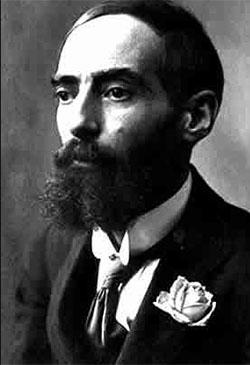Poet
Camilo Pessanha

Camilo Pessanha
(Portugal, 1867 - 1926)
© photographer unknown
Biography
Overlapping with literary nostalgists like Teixeira de Pascoaes and modernists like Fernando Pessoa, Camilo Pessanha produced a body of poetry that defies easy categorization. Clepsydra – the only title published in the poet’s lifetime – resembles the work of his French symbolist idols, including Baudelaire and Verlaine, while channeling a distinctly Portuguese ethos in its references to fading imperial splendor. An inveterate obfuscator or a musical genius depending on whom you ask, Pessanha left behind mysterious, mellifluous poems that found an admiring audience in the infamous modernist group, Geração d’Orpheu.Much has been made of Pessanha’s addiction to opium, and of his reluctance to publish poetry. Far more unusual, though less scandalous, was the poet’s scholarly interest in Chinese literature. In 1913, he published unadorned Portuguese versions of Ming Dynasty elegies in the Macanese journal O Progresso. His deep respect for the Chinese language is all the more remarkable in light of the slapdash methods that characterized more famous, roughly contemporaneous translations of Eastern classics by Western writers, such as Edward FitzGerald’s Rubáiyát of Omar Khayyám.
Pessanha no doubt reveled in the extended tonal range of Macau’s Cantonese dialect, and more broadly in the lexical and textural variety of poetry. His unmatched ear for language is on display throughout his oeuvre, though perhaps nowhere more fantastically than in ‘Chorai arcadas / Do violoncelo’ (Weep, O Wildly/ Arching bows). This poem – one of Fernando Pessoa’s favorites – constructs an arresting dreamscape through a series of unusual rhymes and double entendres. It is this incantatory power in Pessanha’s poetry that has haunted Portuguese readers around the globe for decades.
© Adam Mahler
BIBLIOGRAPHYIn Portuguese
Published first in 1920, Clepsydra has since been republished in expanded editions:
Clepsydra; poemas de Camillo Pessanha. Lisboa, Edições Lusitania, 1920.
Oito Elegias Chinesas. Tradução e notas. Lisboa: Edições “Descobrimentos,” 1931.
Clépsidra, poemas de Camilo Pessanha. Nota explicativa de João de Castro Osório. Lisboa: Ática, 1945. [
A “Clépsidra” de Camilo Pessanha. Esther de Lemos, ed. Porto: Tavares Martins, 1956.
Clépsidra: poemas de Camilo Pessanha. Lisboa: Ática, 1956. [3rd ed.]
Clepsidra e outros poemas. Introdução crític-bibliográfico por João de Castro Osório. Lisboa: Ática, 1969. [4th ed.]
Clépsidra e outros poemas. Introdução crítico-bibliográfico por João de Castro Osório. Lisboa: Ática, 1973. [5th ed.]
Clepsydra. Estabelecimento de texto, introdução crítica, notas e comentários por Paulo Franchetti. Lisboa: Relógio d'Agua, c1995.
Clepsidra. Barbara Spaggiari, Carlos Reis, eds. Lisboa: Imprensa Nacional – Casa da Moeda, 2014.
In French
Clepsydre et autres poèmes, traduit de portugais par Christine Pâris-Montech., Verfeil-sur-Seye: le Lézard, 1991.
Clepsydre. Michel Chandeigne, Ariane Witkowski et al. Paris: La Diférence, 1991.
In Spanish
Clepsidra. Traducción y presentación de Amador Palacios. Madrid: Hiperión, 1995.
In Italian
Clessidra, a cura de Barbara Spaggiari. Torino: Giulio Einaudi editore, 2000.
Prose and translations
Oito Elegias Chinesas. Tradução e notas. Lisboa: Edições “Descobrimentos,” 1931.
Camilo Pessanha prosador e tradutor. Organização, prefácio e notas de Daniel Pires. Macao: Instituto Português do Oriente; Instituto Cultural de Macau, 1992.
Elegias chinesas. Tradução poética de Camilo Pessanha, pintura de Pedro Barreiroa, organização de Pedro Barreiros. Lisboa: Gradiva, 1999.
Contos, crónicas, cartas escolhidas e textos de temática chinesa. Org. e notas de António Quadros. Lisboa: Publicações Europa- América, 1988.
Poems
Poems of Camilo Pessanha
Sponsors
























